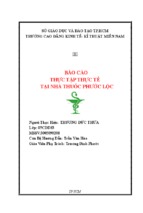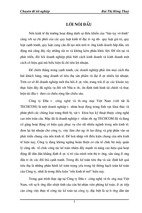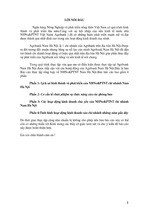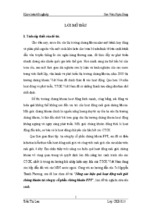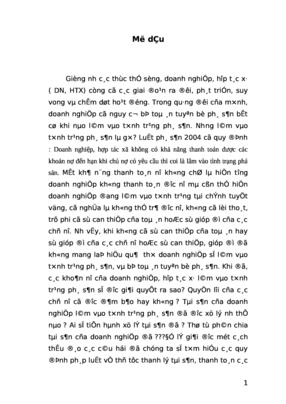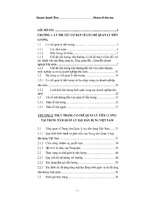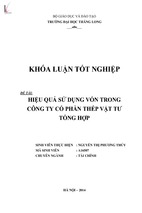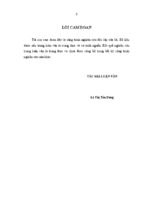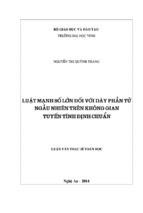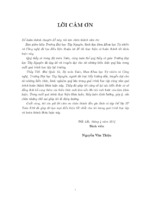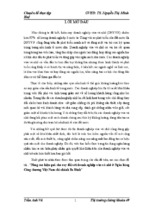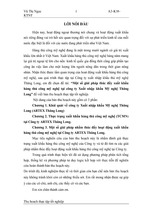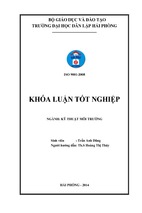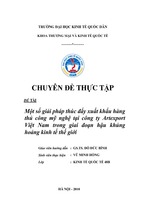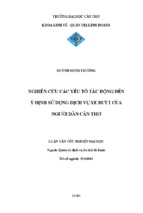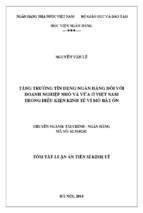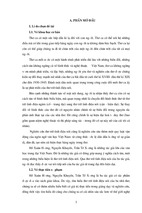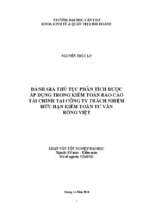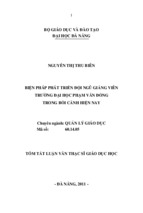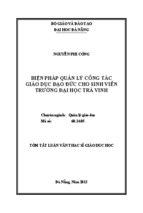1
2
MINISTRY OF EDUCATION AND TRAINING
UNIVERSITY OF DANANG
The thesis has been completed at the College of Foreign Languages,
University of Danang.
HUYNH ANH HONG
AN INVESTIGATION INTO LINGUISTIC DEVICES
Supervisor: Tran Quang Hai, Ph.D.
Examiner 1: Le Tan Thi, Ph.D.
OF DECLARATIONS IN DIPLOMATIC TEXTS
IN ENGLISH AND VIETNAMESE
Field
Code
: The English Language
: 60.22.15
Examiner 2: Assoc. Prof. Dr. Truong Vien
The thesis will be orally defended at The Examining Committee.
Time: July 2011
Venue: Tay Nguyen University
MASTER THESIS ON THE ENGLISH LANGUAGE
(A SUMMARY)
The thesis is accessible for the purpose of reference at:
- The Library of College of Foreign Languages, University of Danang
Danang - 2011
- Information Resource Center, University of Danang
3
4
Another aim of this research is to identify the similarities and
CHAPTER 1
INTRODUCTION
1.1. RATIONALE
differences of linguistic devices of declarations in diplomatic texts in
English versus Vietnamese.
1.2.2. Objectives
The establishment of the diplomatic ties among the countries
� To find out which linguistic devices of declarations are
in the world is quite necessary for each country because external
often used in diplomatic texts in English versus
relations help create numerous opportunities and advantages:
Vietnamese.
stabilizing political security, attracting foreign investment capitals,
� To identify the similarities and differences of linguistic
strengthening the development for economy, culture, education,
devices of declarations in diplomatic texts in English
health and technology and so on.
versus Vietnamese.
In the current era of globalization, English plays a very
� To put forward some implications for translators who are
important role in almost every aspect of the society, especially in
majored in the translation for documents from English
diplomacy. Language in diplomacy in general as well as English in
into Vietnamese and vice versa.
diplomacy in particular has specific features which are rather
1.3. SIGNIFICANCE OF THE STUDY
different from English in daily communication. Thus, the study of
Diplomacy is of a decisive and paramount importance in
language in diplomacy helps understand more deeply and exactly the
whatever era we live in because diplomacy here includes a wide
typical and specific features of language in diplomacy and the
range of fields in the society such as diplomacy in culture, in
content of diplomatic texts in particular situations. Therefore, I
education, in economy, in politics and so on. Cooperation and
decide to do the research: “An investigation into linguistic devices of
integration are always in the leading strategies for the cause of
declarations in diplomatic texts in English and Vietnamese”.
development of each country. Therefore, this thesis - An
1.2. AIMS AND OBJECTIVES
investigation into linguistic devices of declarations in diplomatic
1.2.1. Aims
texts in English and Vietnamese- is to provide translators with
This research aims to discover typical features of
features of declarations in diplomatic texts in the two languages.
declarations in diplomatic texts and find out the differences between
They have careful and elaborate choices of words, phrases and
English commonly employed in diplomacy and English in daily
sentences suitably in different contexts. In addition, the style of
communication.
language employed in diplomacy must be clear, coherent and formal.
5
6
1.4. RESEARCH QUESTIONS
1. What are the features of declarations in diplomatic texts
CHAPTER 2
LITERATURE REVIEW & THEORETICAL BACKGROUND
in English and Vietnamese in terms of syntax, semantics
and pragmatics?
2. What are the similarities and differences of declarations
3.
2.1 . LITERATURE REVIEW
In foreign countries, there have been some outstanding
in diplomatic texts in English and Vietnamese ?
linguists who laid the foundation for speech acts such as Austin
What are some implications of inguistic devices of
(1962) and his follower- Searle (1965). There are some works such as
declarations in diplomacy for Vietnamese learners of
How to do things with words by Austin (1962); Speech Acts: An
English and English learners of Vietnamese and for
Essay in the Philosophy of Language (1965) by Searle.
translators?
1.5. SCOPE OF THE STUDY
In Vietnam, there have also been a great number of linguists
who have done research on speech acts such as Nguyễn Thiện Giáp
The research paper is to study only linguistic communication
(2000), Nguyễn Đức Dân (1998) , Cao Xuân Hạo (1999). What’s
whereas no attention is paid to non-linguistic communication such as
more, there are some master theses related to speech acts like:“
facial expressions, gestures, postures and so on.
Performative Verbs in English versus Vietnamese” by Trần Ngọc Mỹ
Next, the investigation merely focuses on linguistic devices
of declarations in terms of syntax, semantics and pragmatics.
Chi (2002), “An investigation into the syntactic and pragmatic
features of Directives in English and Vietnamese”by Nguyễn Thị Tố
Finally, although there are so many kinds of declarations in
Nga (2002), “A study on the syntactic, semantic and pragmatic
English versus Vietnamese in every field of the society, this research
features of commissives in English versus Vietnamese “ by Lê Văn
takes notice of declarations in diplomatic texts in English and
Bá (2005).
Vietnamese only.
2.2 .THEORETICAL BACKGROUND
1.6. ORGANIZATION OF THE STUDY
2.2.1. Speech Act Theory
Chapter 1 is “Introduction”. Chapter 2 is “Literature Review
The speech act theory was initiated by the Oxford
and Theoretical Background”.Chapter 3 is “Research Method and
philosopher John L. Austin, whose posthumous work How to do
Procedures”. Chapter 4 is “Discussion and Findings”. Chapter 5 is
things with words (1965) had an enormous impact on linguistic
“Conclusion and Implications”.
philosophy, and thereby on linguistics, especially in its pragmatic
variant. In his work, he presented a new picture of analyzing
meaning; meaning is described in a relation among linguistic
conventions correlated with words/ sentences. When the speaker says
7
8
something to the hearer, he/she does not describe or report some state
2.2.1.2. Performatives
of affairs, but performs an action.
In spite of the fact that any particular illocutionary force may
Austin’s thinking was further developed and systematized by
be effectively conveyed in a variety of ways, there is one typical form
the American philosopher John R. Searle. Speech acts are defined as
of utterance that expresses it directly and conventionally called the
“ the basic
explicit performatives. In English, there exists a normal form of the
or minimal units of linguistic communication”.
Furthermore, John Searle said that "All linguistic communication
explicit performatives as follows:
involves linguistic acts. The unit of linguistic communication is not,
I (hereby) Vp you (that) S’
as has generally been supposed, the symbol, word, or sentence, or
I hereby declare this bridge to be opened.
even the token of the symbol, word, or sentence, but rather the
2.2.1.3. Explicit and Implicit Performatives
production or issuance of the symbol or word or sentence in the
Explicit performatives are those which possess the following
performance of a speech act."
characteristics. They tend to begin with a verb in simple present tense
2.2.1.1. Components of Speech Acts
and the subject of the verb is in the first person: I order, I promise, I
The locutionary act is the utterance with a particular form
declare, I christen, I name, I advise and so on.
and a more or less determinate meaning according to the rules of a
Implicit performatives : Based
on
Austin’s
viewpoint,
given language. This term equally refers to the surface meaning of
implicit performatives are ones without performative verbs. Besides,
the utterance.
he also realized that implicit performatives do not always have an
The illocutionary act is understood as some kind of intended
obvious explicit performatives understood.
message that a speaker assigns to the sentence that he utters. An
I’ll buy you a bunch of blue ribbon.
illocutionary act makes clear this aspect of an utterance and is the
2.1.2.4. Classification of Speech Acts
further act that is performed in performing a locutionary act.
According to Austin (1962), there are five types of speech
The perlocutionary act is quite different from the locutionary
act and the illocutionary act. The perlocutionary act is an act
acts as follows: a)Verdictives; b)Exercitives;
c)Commissives;
d)Behabitives; e)Expositives.
performed by saying something. It is a speech act which gets
Searle argues that Austin’s classifications “does not maintain
someone to do or realize something following on from the
a clear distinction between illocutionary verbs and acts, nor are the
illocutionary act. It is the bringing about of effects, both intentional
categories based on consistently applied principles”. Therefore, he
or unintentional, on the audience by means of uttering a sentence.
proposes five different classes of speech acts: a) Directives; b)
Declarations; c)Representatives; d) Expressives; e) Commissives
10
9
Table 2.1. The five general functions of speech acts
(following Searle 1979)
Speech act type
Direction of fit
2.2.2. Cooperative Principles
According to Grice, there are four maxims included in this
S = speaker;
X = situation
principle:
� Maxim of quality
Declarations
Words change the world
S causes X
� Maxim of quantity
Representatives
make words fit the world
S believes X
� Maxim of relevance
Expressives
make words fit the world
S feels X
� Maxim of manner
Directives
make the world fit words
S wants X
Commissives
make the world fit words
S intends X
2.2.3. Politeness Principle
2.2.3.1. Concepts of Politeness
2.2.1.5. Indirect Speech Acts
2.2.3.2. Maxims of Politeness by Geoffrey Leech
According to Searle, direct speech acts are defined as
2.2.3.3. Politeness Theory by Brown and Levinson
utterances in which the propositional content (sentence meaning) of
2.2.4. Deixis
the utterance is consistent with what the speaker intends to
2.2.4.1. Person Deixis
accomplish (speaker meaning). For indirect speech acts, the
2.2.4.2. Place Deixis
relationship between sentence meaning and speaker meaning is not
2.2.4.3. Time Deixis
necessary to exist.
CHAPTER 3
2.2.1.6. Felicity Conditions
For Austin, the felicity conditions are that the context and the
roles of participants must be recognized by all parties; the action must be
carried out completely, and the persons must have the right intentions.
For Searle, there is a general condition for all speech acts, that
the hearer must hear and understand the language, and that the speaker
must not be pretending or play-acting. He proposes four kinds of
RESEARCH METHODS AND PROCEDURES
3.1. RESEARCH METHODS
• Qualitative and quantitative method.
• Statistic and descriptive method.
• Comparative and contrastive method.
3.2. RESEARCH PROCEDURES
conditions including preparatory condition, propositional content
� Collecting data
condition, sincerity condition and essential condition. For declarations,
� Making sample selection
the rules are that the speaker must believe that it is possible to carry out
� Classifying linguistic devices of declarations in diplomatic
the action: they are performing the act in the hearer’s best interests;
they are sincere about wanting to do it and the words count as the act.
texts in English and Vietnamese
� Describing and analyzing each linguistic feature
11
12
� Drawing out similarities and differences of declarations in
Pattern 1:
terms of syntax, semantics and pragmatics.
We + will + bare-inf
� Giving conclusion and suggesting a few implications.
(1) As long as he remains in power, as long as your nation is
CHAPTER 4
FINDINGS AND DISCUSSION
ruled by an indicted war criminal, we will provide no
support for the reconstruction of Serbia. But we are to
ready to provide humanitarian aid, and to help to build a
4.1. SYNTACTIC FEATURES OF THE DIDTS
better future for Serbia, too, when its government
4.1.1. Syntactic Features of the Declarations in Diplomatic
Texts in English and Vietnamese.
4.1.1.1. Syntactic
Features
of
the
presents tolerance and freedom, not repression and terror.
Pattern 2:
Declarations
in
S(we) + aux (will) + V + no + Noun + Prep. Phrase
Diplomatic Texts in English
Table 4.2: The Syntactic Patterns Used with “Declare”
Table 4.1: The Synthesis of the Commonly-Used Forms of
Declarations in English Texts of Diplomacy
Order
Forms
Occurrence
Percentage (%)
1
declare
84
31.70
2
announce
4
1.50
3
proclaim
19
7.20
4
undertake
3
1.13
5
authorize
3
1.13
6
Affirm
4
1.50
7
we want
15
5.70
8
we must
12
4.50
9
we will + bare-inf
91
34.50
10
we shall + bare-inf
17
6.42
11
we are going to + bare-inf
4
1.50
12
I am determined + to-inf
7
2.60
13
We are eager + to-inf
2
0.75
265
100%
No
Syntactic Patterns
Occurrence
%
1
We + solemnly + declare + Noun Clause
18
21.42
2
I + declare + Noun Phrase + Adj
2
2.38
3
I am now pleased + to declare + NP+ Adj
2
2.38
4
I would like + to declare + Noun Phrase + Adj
1
1.19
1
1.19
5
I now have the honour + formally declare + Adj+ Noun
6
It’s my pleasant duty + to declare + NP+ Adj
1
1.19
7
S + is hereby declared + to-inf
3
3.57
8
S + declare + Noun Phrase + to-inf
2
2.38
9
S(proper name) + declare + Noun Clause
35
41.67
10
S(singular) + is hereby formally + declared
2
2.38
11
We + do hereby + declare + (solemnly )+ Noun Clause/NP
8
9.52
12
We + hereby declare + Noun + to-inf
4
4.77
13
We + declare publicly + Noun Clause
2
2.39
14
We + do solemnly + declare + Noun Clause/ N. P
3
3.57
Total:
84
100%
13
From the table 4.2, it can be seen that there are fourteen
syntactic Patterns employed to give the declarations in the English
texts of diplomacy.
14
Pattern 7:
I now have the honour + to formally declare + Adj+ Noun
(6) I now have the honor to formally declare open ASEM 5.
Pattern 3:
Pattern 8:
We + solemnly + declare + Noun Clause
(2) We, in the name of the people of Lower Canada, adoring the
decree of the divine providence who allows us to overthrow
It’s my pleasant duty now + to declare + Noun Phrase + Adj
(7) It is my pleasant duty now to declare this conference open.
Pattern 9:
the government which has ignored the reason for which it
S + is hereby declared + to-inf
was created, and allows us to choose the form of
(8) Be enacted by the Senate and House of Representatives
government most likely to establish justice, to ensure
of the United States of America in Congress assembled,
domestic peace, to provide for common defense, to promote
that war be and the same is hereby declared to exist
the common good, and to guarantee to us and our posterity
between the United Kingdom of Great Britain and
the benefits of civil and religious Liberty, SOLEMNLY
Ireland and the dependencies thereof, and the United
DECLARE that beginning to this day, the People of Lower
States of America and their territories.
Canada is EXONERATED from any allegiance to Great
Pattern 10:
Britain, and that all political connections between this
power and Lower Canada ceases as of this day.
S (we) + declare + Noun Phrase + to-inf
(9) We declare our intention to take all steps necessary to
Pattern 4:
facilitate full membership in the European Union as soon
I + declare + Noun Phrase + Adj
as feasible and implement the reforms required for
(3) While thanking you for your participation, I declare this
conference open and wish you all a fruitful work.
Pattern 5:
European and Euro-Atlantic integration.
Pattern 11:
S(proper name) + declare + Noun Clause
I am now pleased + to declare + NP + Adj
(10) The United States of America and the Russian
(4) I am now pleased to declare this Conference open.
Federation declares that we will respect the essential
Pattern 6:
values of democracy, human rights, free speech and
I would like + to declare + Noun Phrase + Adj
(5) I would like to declare the seminar open and wish all
participants a productive and rewarding day.
free media, tolerance, the rule of law and economic
opportunity.
15
16
Pattern 12:
(14) We declare publicly that all states are entitled to rely
S(singular) + is hereby formally + declared
upon this declaration, and appeal to them to extend to us
(11) Therefore be it resolved by the Senate and House of the
their support and friendship.
Representatives of the United States of America in
Pattern 16:
We + do solemnly + declare + Noun Clause
Congress assembled, that the state of war between the
United States and the Imperial government of Japan,
4.1.1.2. Syntactic
which has thus been thrust upon the United States, is
Diplomatic Texts in Vietnamese
hereby formally declared.
of
(12) And having as witness to the rectitude of our intentions
the Supreme Judge of the Universe, and under the
protection of our Powerful and Humanitarian Nation,
the United States of America, we do hereby proclaim
and declare solemnly in the name of the people of these
Philippine Islands that they are and have the right to
be free and independent; that they have ceased to have
allegiance to the Crown of Spain.
Pattern 14:
We + hereby declare + Noun + to-inf
(13) We, the democratically elected leaders of our people,
hereby declare Kosovo to be an independent and
sovereign state.
Pattern 15:
We + declare publicly + Noun Clause
Declarations
in
Declarations in Vietnamese Texts of Diplomacy
Order
Forms
Pattern 13:
We + do hereby + declare + solemnly + Noun Clause
the
Table 4.3: The Synthesis of the Commonly used Forms of
This syntactic construction becomes more detailed in this diagram.
S + be + hereby+ formally + declared (p.p)
Features
1
2
3
4
5
6
7
8
9
10
11
12
13
14
15
16
Tôi xin (long trọng) tuyên bố
Tôi cho rằng
Chúng tôi tuyên bố
Chúng tôi trịnh trọng tuyên bố
Chúng tôi/ Chúng ta nhấn mạnh
Chúng tôi nhất trí
Chúng tôi ủng hộ
Chúng tôi ñồng ý
Chúng tôi ghi nhận
Chúng tôi khẳng ñịnh
Chúng tôi tái khẳng ñịnh
Chúng tôi nhất quán ủng hộ
Chúng tôi sẽ
Chúng tôi phải
Việt Nam kiên trì
Việt Nam luôn ủng hộ
Total:
Occurren Percentage
ce
(%)
17
8.42
5
2.47
5
2.47
3
1.48
17
8.42
7
3.47
21
10.40
4
1.98
4
1.98
19
9.40
21
10.40
8
3.96
29
14.35
7
3.47
8
3.96
27
13.37
202
100%
17
Pattern 1:
18
(18) Chúng ta nhấn mạnh sự cần thiết phải xây dựng chiến
lược và kế hoạch trong quan hệ với các bên ñối thoại
Tôi + adv( long trọng/trân trọng) + Vp (tuyên bố) + V
thông qua các khuôn khổ ASEAN +1 một cách toàn
(15) Tôi xin tuyên bố bế mạc Đại hội thi ñua yêu nước toàn quốc lần thứ VII.
diện, nhằm làm những quan hệ ñối tác này ngày càng
Pattern 2:
thực chất hơn.
Tôi cho rằng + Noun Clause
(16) Tôi cho rằng Hội nghị của chúng ta nên tập trung xem
xét một số vấn ñề quan trọng sau:
Thứ nhất, cần tăng cường hợp tác ñể ñảm bảo an ninh năng
lượng cho ASEAN trong bối cảnh tiêu thụ năng lượng của ASEAN tiếp
Pattern 6:
S( Chúng tôi/ Chúng ta) + aux (need) + V + Prep. Phrase
Pattern 7:
S(Việt Nam) + Adv of frequency + V + Noun Phrase
tục tăng cao ñể ñáp ứng nhu cầu phục hồi và phát triển cũng như yêu cầu
(19) Chúng tôi khẳng ñịnh lại quyết tâm ñẩy mạnh hành
về ứng phó với biến ñổi khí hậu, trong bối cảnh giá các loại nhiên liệu
ñộng hướng tới mục tiêu hình thành Cộng ñồng
biến ñộng khó lường và các nguồn cung cấp ngày càng thu hẹp.
ASEAN vào năm 2015.
Thứ hai, việc ứng phó với biến ñổi khí hậu, ñi ñôi với việc sử
dụng năng lượng có hiệu quả, phải là một trong các ưu tiên hàng ñầu
của chúng ta trong thời gian tới.
Pattern 8:
S(chúng ta) + V (khẳng ñịnh lại ) + Noun phrase + to-inf phrase (Cụm ñộng từ)
Pattern 9 :
Pattern 3:
S (Chúng tôi) + aux (will/shall/ must) + be + P.P + Prep. Phrase
S (Chúng tôi) + Vp (tuyên bố) + V(thoát ly hẳn/xóa bỏ hết/xóa bỏ tất cả) + NP
Pattern 4:
4.1.2 Similarities and Differences of Syntactic Features of the
Declarations in Diplomatic Texts in English and Vietnamese.
S (Chúng tôi) + adv (trịnh trọng) + Vp (tuyên bố) + V
4.1.2.1. Similarities
(17) Chúng tôi, Chính phủ lâm thời của nước Việt Nam Dân
Firstly, the linguistic elements for realisation of the
chủ Cộng hoà, trịnh trọng tuyên bố với thế giới rằng:
declarative speech acts are that in the two languages “We” and “I” in
Nước Việt Nam ñược quyền hưởng Tự do, Độc lập, và
English as well as “Chúng tôi/Chúng ta” or “Tôi” as subjects are
sự thật ñã trở thành một nước Tự do - Độc lập.
employed to express the declarations in the texts of diplomacy in
S (chúng tôi) + adv (trịnh trọng) + Vp (tuyên bố) + I.O (với thế giới) + D.O (that-clause)
Pattern 5:
S (Chúng tôi/ Chúng ta) + V (nhấn mạnh) + NP + Prep. Phrase
English and Vietnamese. Next, the explicit performative verb mainly
used to express the declarations in the two languages is “ declare” in
19
20
English and “tuyên bố” in Vietnamese, which are always cọnjugated
English texts are frequently used whereas the emphatic forms seldom
in the present tense.
occur in the Vietnamese ones.
Secondly, with a view to achieving the most efficient results,
Secondly, the passive forms for the declarations in the
the two languages contain implicit performative verbs in expressing
English texts of diplomacy are much more common than those for
the declarations in the texts of diplomacy. It means that not all
the declarations in the Vietnamese texts of diplomacy.
declarations in the texts of diplomacy contain the markers of
Last but not least, the subject “we” in the English texts of
declarative speech acts like “ We declare” , “I declare”, “Chúng tôi
diplomacy occur more frequently than the word with the same
trịnh trọng tuyên bố”, “Tôi tuyên bố”.
meaning in the Vietnamese texts of diplomacy.
Thirdly, in both languages, the adverbs “hereby”, “solemnly”
and “formally” frequently occur in giving the declarations in the
texts of diplomacy, especially in the declarations of war and
4.2. SEMANTIC FEATURES OF THE DECLARATIONS IN
DIPLOMATIC TEXTS
4.2.1. Semantic Features of the Declarations in Diplomatic
declarations of independence. The purpose of using these abverbs is
Texts in English and Vietnamese
to enhance the formality and seriousness of what is going to be
4.2.1.1. Semantic
declared.
Features
of
the
Declarations
in
Diplomatic Texts in English
Fourthly, the modal verbs also occur with high frequency in
(25) We will starve terrorists of funding, turn them one against
English as well as Vietnamese so as to state the actions to be done in
another, drive the from the place to place, until there is no
the future.
refuge or no rest. And we will pursue nations that provide
Last but not least, apart from the first person subjects like
aid or safe haven to terrorism. Every nation, in every region,
“we/I” in English and “ Tôi/ Chúng tôi” in Vietnamese are normally
now has a decision to make. Either you are with us, or you
applied to give the declarations, other subjects functioning as the first
are with the terrorists. From this day forward, any nation
person ones such as “Việt Nam”, “Chính phủ”, “Lãnh ñạo Bộ”, “the
that continues to harbour or support terrorism will be
United States”, “the Government” and so on are also used in the
regarded by the United Nations as a hostile regime.
diplomatic texts in both languages.
4.1.2.2. Differences
Firstly, the syntactic Patterns employed to give the
declarations in the English texts of diplomacy are much more
4.2.1.2.
Semantic Features of the Declarations in
Diplomatic Texts in Vietnamese
4.2.2. Similarities and Differences of Semantic Features of
the Declarations in Diplomatic Texts in English and Vietnamese.
abundant than those in Vietnamese. In addition, the emphatic form
4.2.2.1. Similarities
with the Pattern “S (plural) + do + hereby declare + O” in the
Firstly, the declarations cover most of the aspects in English
21
22
as well as in Vietnamese.
…..We will direct every resource of our command, every
Secondly, in term of semantic representation, the word and
means of diplomacy, every tool of intelligence, every
phrases employed in the texts of diplomacy in the two languages are
instrument of law enforcement, every financial influence,
simple and clear enough, so the hearers find it easy to clarify the
and every necessary weapon of war to the disruption and
purposes of the declarations.
to the defeat of the global terror network.
Thirdly, in both English and Vietnamese, not all aspects of diplomacy resort to
the explicit performative verbs to express the declarations.
4.3.1.2.
Pragmatic
Features
of
the
Declarations
in
Diplomatic Texts in Vietnamese
The last similarity between the declarations in the English
(21) Bởi thế cho nên, chúng tôi, lâm thời Chính phủ của nước
texts of diplomacy and the Vietnamese texts of diplomacy is that the
Việt Nam mới, ñại biểu cho toàn dân Việt Nam, tuyên bố
passive voice is used to make an emphasis for the topics that the
thoát ly hẳn quan hệ thực dân với Pháp, xóa bỏ hết
speakers want to focus on.
những hiệp ước mà Pháp ñã ký về nước Việt Nam, xóa bỏ
4.2.2.2. Differences
tất cả mọi ñặc quyền của Pháp trên ñất nước Việt Nam.
From the examples already analyzed, it can be seen that the
Vì những lẽ trên, chúng tôi, chính phủ lâm thời của nước
subject “we” in English occurs more frequently than its semantic
Việt Nam Dân chủ Cộng hòa, trịnh trọng tuyên bố với thế
equivalent “Chúng tôi/Chúng ta” in Vietnamese.
giới rằng:
The adverbs in the declarations in the English texts of
Nước Việt Nam có quyền hưởng tự do và ñộc lập, và sự
diplomacy are placed in different positions in the sentences. In spite
thật ñã thành một nước tự do ñộc lập. Toàn thể dân tộc
of this, the semantic meaning does not cause any changes. On the
Việt Nam quyết ñem tất cả tinh thần và lực lượng, tính
contrary, if the adverbs in the sentences in Vietnamese are put in
mạng và của cải ñể giữ vững quyền tự do, ñộc lập ấy.
different places like in English, it will become unacceptable.
4.3.2. Similarities and Differences of Pragmatic Features of
4.3. PRAGMATIC FEATURES OF THE DIDTs
the Declarations in Diplomatic Texts in English and Vietnamese.
4.3.1. Pragmatic Features of the Declarations in Diplomatic
Texts in English and Vietnamese.
4.3.1.1. Pragmatic
Features
4.3.2.1. Similarities
Firstly, all of the people who give the declarations in all of
of
the
Declarations
in
Diplomatic Texts in English
(20) Our war on terror begins with Al Qaeda, but it does not
end there. It will not end until every terrorist group of
global reach has been found, stopped and defeated……..
the above-mentioned texts of diplomacy in English as well as in
Vietnamese are the leaders of the countries in the world and have the
authority or power to give the declarations.
Secondly, in the two languages, the declarations are uttered
by the leaders of the countries in the globe in different aspects really
23
24
bring about the new situations and changes for certain countries in
Table 4.4: Summary of Polite Markers in the Declarations in
certain fields.
Last but not least, all of the declarations in the diplomatic
texts in English and Vietnamese require high formality and seem to
make known publicly. In addition, the declarations not only cause
people to know what they should think but also make them act
accordingly.
4.3.2.2. Differences
It can be seen that except for common ways of expression of
the declarations like “I declare”, “We declare” and so on, the
declarations are expressed in different ways
so as to show the
politeness. However, the politeness markers in the English texts of
diplomacy are rather different from those in the Vietnamese texts of
diplomacy.
In English, the common expressions like I am now pleased
English and Vietnamese
Languages
Representations
of politeness
English
-Polite expressions:
+I am now pleased +
to declare
Softening the act/ +I would like + to
reducing the force
declare
+I now have the
honour + formally
declare
+ It’s my pleasant
duty + to declare
+I am glad to
announce
Vietnamese
Polite expressions:
+ Tôi xin tuyên bố
+Tôi trịnh trọng
tuyên bố
+ Tôi trân trọng
tuyên bố
+Tôi xin long
trọng tuyên bố
+ to declare, I would like + to declare, I now have the honour +
formally declare, It’s my pleasant duty + to declare or I am glad to
announce are employed so as to present politeness in giving the
CHAPTER 5
CONCLUSION AND IMPLICATIONS
declarations.
In contrast, in Vietnamese, in order to express politeness in
5.1. CONCLUSION
declaring something, the word xin together with the common adverbs
In syntax, in order to express the declarations in English as
like “long trọng”, “trịnh trọng” or “trân trọng” is supplemented in
well as in Vietnamese, a variety of syntactic Patterns are employed
the texts of diplomacy.
not only with explicit performatives like declare, proclaim, announce
but also with implicit performatives. If the performative verbs are
employed, they must be in the present simple tenses and their
subjects must be in the first person (singular or plural). The adverbs
like “hereby”, “solemnly”, “formally” in English and “nay”, “long
trọng”, “chính thức” in Vietnamese are often present in the
25
26
declarations of the texts of diplomacy in both languages. Next, the
only for teaching and learning English in specialized classes but also
modal verbs like We will, We must, Chúng ta sẽ, Chúng ta phải,
for those who are interested in doing the translations.
Chúng ta cần are also employed to express the declarations in the
5.3. LIMITATION OF THE STUDY
texts of diplomacy in the two languages. Both active voice and
As far as I am aware, the declarations cover in most aspects
passive voice are used to express the declarations in the syntactic
of the society. However, this research only pays much attention to the
Patterns of the texts of diplomacy in English and in Vietnamese.
declarations in several common and clear-cut contexts such as
In terms of semantic features, the words and phrases in the
declaring war, declaring the ending of war, declaring independence,
declarations in the texts of diplomacy are clear and easy to
and others in socio-economic respects. Furthermore, the conditions of
understand in order that the hearers can interpret what contents the
space and time, reference books, material are also the difficult
declarations contain and they can carry out after that.
elements for the researcher to provide more efficient and more
In pragmatic aspects, the texts of diplomacy in English as
intensive focus on the declarative speech acts. Thus, mistakes and
well as in Vietnamese employ the declarations in most aspects such
shortcoming in the process of doing the research are inevitable.
as declaring war, declaring the ending of war, declaring the opening
5.4. SUGGESTIONS FOR FURTHER RESEARCHES
or the closing of a meeting, declaring independence and so on. Not
In this thesis, a big concentration on the three linguistic
anyone is able to declare something to make any changes for certain
aspects of the declarations in the texts of diplomacy in terms of
fields of the society except for those who have the authority or
syntax, semantics and pragmatics has been made. To my knowledge,
power. What’s more, in order to achieve the most efficient results
the following points should be taken into considerations for further
between the interlocutors, the markers in English like I am now
researches.
pleased + to declare, I would like + to declare, I now have the
� Lexical features of the declarations in the texts of diplomacy.
honour + formally declare, It’s my pleasant duty + to declare or I am
� Stylistic features of the declarations in the texts of diplomacy.
glad to announce and in Vietnamese like “xin” “long trọng”, “trịnh
� Cultural features of the declarations in the texts of diplomacy.
trọng” or “trân trọng” are supplemented to create the politeness in
communication.
5.2. IMPLICATIONS
Apart from the fact that I have learnt so much useful and
interesting knowledge through the process of doing research on this
thesis. I also hope that the discoveries of the linguistic features of the
declarations in the texts of diplomacy will be of great benefits not
- Xem thêm -

